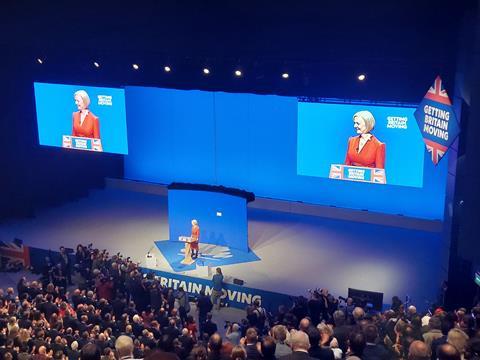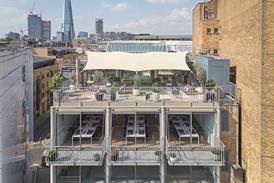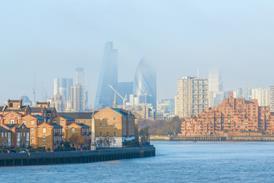Liz Truss is promising that reducing tax will magically reverse Britain’s economic decline but history suggests there are no easy fixes, writes Ben Flatman

And so, it is over. Not Liz Truss’s premiership (although its days are surely numbered) but the 2022 Conservative Party conference.
It was a surreal event. On the fringes there was lively debate and wise counsel from construction industry figures. But at its centre was a political party so ideologically blinded to the country’s true challenges that it seems to be governing in a parallel universe.
Truss’s closing speech was a masterclass in tepid platitudes. She said she was not “interested in talking” but rather wanted to “get things done”. And of course, she wanted “to get Britain moving”.
This meagre gruel did not seem to particularly impress even the party members. The greatest round of applause came when a Greenpeace heckler got thrown out of the hall – red meat to the Tory base.
On one level Truss’s analysis of the challenges that Britain is facing is not wrong. Britain is in a major crisis. Decades of underinvestment have left the UK economy with low productivity and anaemic growth.
>> Also read: Day three at the tory conference: Rees-Mogg tinkers while business despairs
>> Also read: Day two at the Tory conference: U-turns and Brexit cast shadow over growth agenda
>> Also read: Day one at the Tory conference: Is levelling up dead in the water?
England is also one of the most centralised major economies in the world, with public spending micromanaged from Whitehall. We lack sufficient housing for the population, and what homes we do have are often poor quality and expensive to heat.
But the problems that businesses face are not primarily due to “big government” or over-regulation. The government is in the wrong place, stuck behind a desk in Whitehall, rather than on the ground in our towns and cities.
And the problem with the regulatory environment is that it is in a state of constant flux. No amount of pointless regulatory tinkering can compensate business for the opportunity cost of an unstable regulatory environment.
Business just wants certainty over at least the medium term. When the government does not provide that, businesses tend to sit on cash rather than invest it.
Instead of offering certainty, Truss told the conference audience that, by the end of the year, “all EU red tape will be consigned to history”. And yet no one in or outside the Conservative Party seems to have so far been able to identify a single significant piece of “EU red tape” that business wants the government to get rid of. Is it possible to imagine a less growth-friendly environment?
In her speech yesterday the prime minister said that “for too long our economy didn’t grow as strongly as it should have done”. On this she is right, but is she unaware of who has been in government for the past decade?
She then spoke about her childhood. “I grew up in the 80s and 90s and saw the boarded-up shops and young people drawn to a life of drugs,” she said.
The 80s were once spoken about as a halcyon time of unalloyed prosperity at Conservative Party conferences. Has Truss also forgotten which party governed for all but three years of those two decades?

One of the ironies of this conference was that the Tories kept on saying they wanted to “get government out of the way” of business, so that companies could “get on” with creating jobs and growth. But everywhere around the conference, the representatives of the construction industry I heard from were saying that all they really wanted was for government to stop the uncertainty, end the constant changes of ministers and provide clarity and intelligent leadership.
Instead, the Tories offer quick and easy-sounding fixes. Tax cuts funded by the magic money tree, and the alluring promise of “investment zones”. It has all been tried before, but as Michael Heseltine noted earlier in the week, “There is no short cut to miracle growth.”
What the country needs – and has needed for decades – is sensible regulation, devolution of political decision making, and a government that uses public sector investment to deliver the skills and infrastrucutre that business needs to thrive. These are things that many of our competitors do as a matter of course.
Truss mentioned a vague desire to build more houses “in the right places”. She has also implied that local communities will regain more control over where housing goes. These are not easily reconcilable objectives. History suggests that this will only exacerbate existing challenges for housebuilders, and lead to even fewer starts on site.
Enabling the public sector to deliver housing at scale for some reason remains an anathema to the Conservatives, a party which under Harold Macmillian was once able to build millions of council homes a year, alongside rapid economic growth.
Labour has thought victory was in the bag on many previous occasions, only for the Tories to win
The focus will now increasingly be on Sir Keir Starmer and Labour. According to a recent YouGov poll, the Conservatives are polling at 21% and Labour on 54%.
I remain sceptical of Labour’s chances. Starmer is stolid rather than inspiring. Nadhim Zahawi described him as a “low-energy Neil Kinnock” in his speech this week. Labour has thought victory was in the bag on many previous occasions, only for the Tories to win.
In response to Truss’s empty “growth, growth, growth” rhetoric, Starmer will need a strong economic plan. If it wins, Labour is likely to inherit a fiscal and economic crisis of a magnitude that no incoming British government has ever confronted before.
















No comments yet